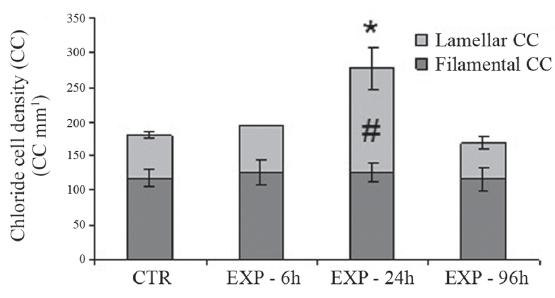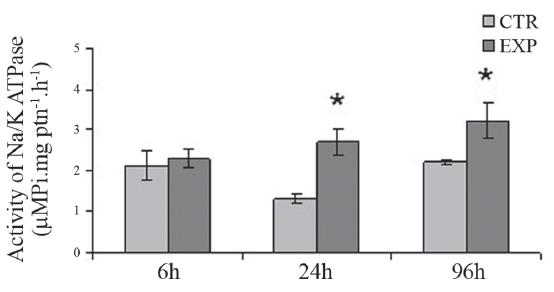The purpose of this work was to evaluate the effects of the water-soluble fraction of gasoline (WSFG) on the Neotropical freshwater fish Prochilodus lineatus. The WSFG was prepared by mixing gasoline in water (1:4) and animals were exposed for 6, 24 and 96h to 5% diluted WSFG or only to water. After exposure, blood was collected from the caudal vein and the gills were removed. The following parameters were analyzed: hematological (hemoglobin, hematocrit, number of red blood cells), osmo-ionic (plasma Na+, Cl- and K+ and plasma osmolarity), metabolic (total plasma proteins and glucose), endocrine (cortisol), density and distribution of chloride cells [CC] in the gills (immunohistochemistry), and branchial Na+/K+-ATPase (NKA) activity. Hemolysis was found to occur after 96h exposure to WSFG, as indicated by the decrease in the hematological parameters analyzed, followed by an increase in plasma K+. Secondary stress response was revealed by the occurrence of hyperglycemia in the three periods of exposure, despite the absence of significant increases in the plasma cortisol. The exposure to WSFG also caused an increase in the quantity of CC and in plasma Na+, after 24h, as well as in the enzymatic activity of NKA and plasma osmolarity, after 24h and 96h. These results indicate that fish exposed to the WSFG showed physiological adjusts to maintain their osmotic balance. However, the increase in the quantity of CC in the lamellae may interfere in the gas exchange impairing respiration.
Chloride cells; Hematology; Hydrocarbons; Na+K+-ATPase; Osmoregulation; Stress response






